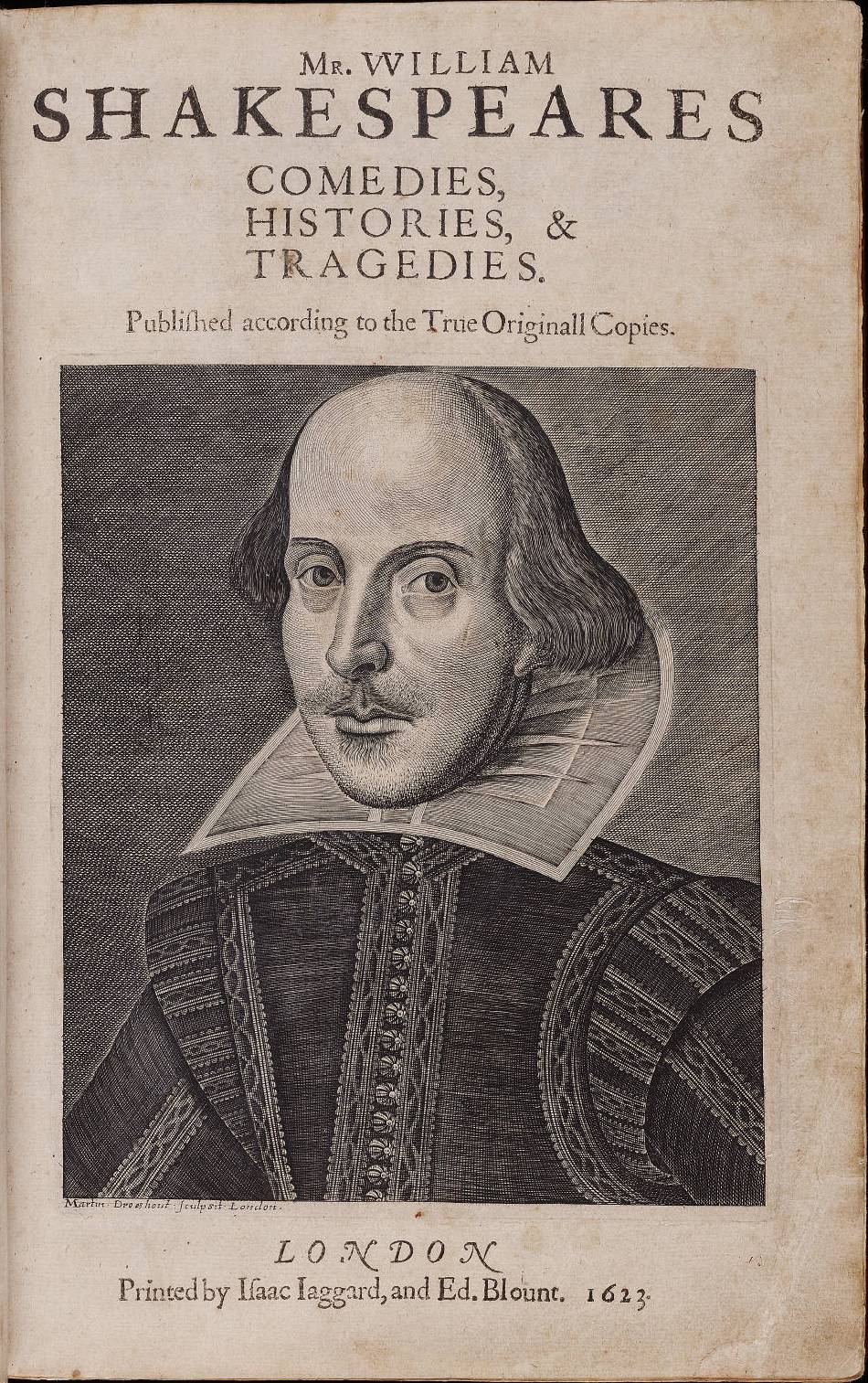About William Shakespeare
William Shakespeare, one of the greatest play-writers of all times, poet, actor, dramatist, was born in Stratford-upon-Avon (Warwickshire) in 1564, moved to London in his 20s and began a successful career as an actor and part-owner of a playing company called the Lord Chamberlain’s Men during the reign of Elizabeth I, but later known as The King’s Men under James I. He wrote approximately 38 plays and 154 sonnets. His plays have translated into every major language and performed in theatres all over the world. He produced some of the finest work in the English language. A posthumous collected edition of his dramatic works was published in 1623 in the First Folio. His company built the Globe Theatre on the South bank of the River Thames. Shakespeare died on 23 April 1616, at the age of 52.
Language myth
Shakespeare was very resourceful and daring with the use of words and accepted new words of every kind. Shakespeare had a liberal approach toward foreign borrowing. He used the new words in a way that they remained close to their etymological meaning. Among his words we find: agile, expostulation, catastrophe, emphasis, accommodation, assassination, armada, barricade, etc. In the most isolated valleys of the Appalachian Mountains, the language of Shakespeare might still be spoken by a small number of people, known as the descendants of the early settlers. Also, in Warwickshire, but this is a myth because speech never stands still according to David Crystal, and a lot has changed between Queen Elizabeth I and Queen Elizabeth II. It is not possible, realistically speaking, that the English of Shakespeare is still ‘alive and kicking’ in rural areas of England, this is a myth.
Quantity myth
Another myth associated with the great writer is the quantity myth, meaning that he
had the largest vocabulary of any English writer. Crystal says that the usual figure given for the size of Shakespeare’s vocabulary is about 20,000 different words. Nowadays, we have over twice as many words but the greatest difference is that we do not use the language as brilliantly as he did. Shakespeare uses 288 Latin word-forms, 310 French word-form, and 36 between Spanish and Italian word-forms. He wrote a lot of everything, from the range of his characters, settings, and themes. Crystal argues that what has helped Shakespeare stand out from the crowd of writers is the fact he not only wrote historical plays, but also love stories, and mental conflicts. Shakespeare could also easily use legal words; indeed, in his plays there are plenty of words belonging to criminal law, civil law, and commercial law (i.e. petition, cause, suit, hearing, oath, witness, magistrate, justice, court) and is very often associated with figurative expression.
Invention myth
According to the invention myth, Shakespeare has nearly ‘invented’ the English language. However, during the Early Modern period, writers used to invent words. The 16th century saw a huge expansion of vocabulary, indeed thousands of words were taken from Latin and Greek.
Translation myth
According to the translation myth, the question is “how far should we go when translating Shakespeare? Are we allowed to simplify his texts?” Actually, English has changed very much during the past 400 years, and the English language written by Shakespeare is no longer comprehensible. Still, a lot depends on the part of a text. Some words are opaque, others more transparent and do not, therefore, pose any problem. In this respect, Crystal suggests to consider the pragmatic force of the expressions not their semantic content.

Style myth
Shakespeare’s style myth is based upon the selection of words he carries out; the sentence length, the sentence structure, word-order; the sound that means a third dimension created by the pattern of vowels, consonants and rhyme; pragmatics. In conclusions, as far as his style is concerned, it is extremely difficult to assess it given the extraordinary range of character, content and the period of time over which he wrote, 20 years. He invented the lexicon and experimented with it. Some words are current, some old, and some new. The new ones are known as ‘coinages’, mainly derived from Latin and Greek. The play Troilus and Cressida features many of these new words (i.e. importless, neglection, oppugnancy, etc.). Some of his coinages were repeated sometimes twice in a quick succession, and then never again. For instance, Shakespeare used to prefer the use of the prefix un-, which can be found in words such as unaware, uncompassionate, uncomfortable, unhappy, unprovoked, unmask, etc.). In addition, Shakespearean grammar changed a little over the past 400 years. Word order and word formations used by Shakespeare still in use today as well as, singular, plural and possessive nouns, countable and uncountable nouns, common and proper nouns. But no apostrophe marking possession. Regarding adjectives, we find more great, more long, and more near, which nowadays have been replaced with greater, longer, and nearer. As for verbs, in Shakespeare’s text we find regular –ed formations and most irregular verbs we use today. However, holp has become helped and situate has become situated, which means that some irregular verbs in Shakespeare time have become regular verbs; the other way round applies as well, because verbs like shaked has changed into shook/shaken and builded has become built.
Last but not least, pronouns
The use of the thou-forms and you-forms dominates Shakespearean texts. The thou-forms are thou, thee, thy, thine, and thy selfe. The you-forms are you, ye, your, yours, and your selfe. The upper classes used you to each other, as a rule, even when they were closely related. When someone changed from thou to you or vice versa, a different emotion or mood was being conveyed. This shift in the use of thou or you was seen as a barometer for attitudes and relationships.
Sunto in italiano a cura di Martina Russo
William Shakespeare, uno dei più grandi sceneggiatori di tutti i tempi, un poeta, un attore, un drammaturgo, nacque a Stratford-upon-Avon (Warwickshire) nel 1564. Scrisse circa 38 drammi e 154 sonetti. Una sua edizione postuma raccolta opere drammatiche fu pubblicato nel 1623 nel primo in folio. La sua compagnia costruì il Globe Theatre sulla riva sud del Tamigi. Shakespeare morì il 23 aprile 1616, all’età di 52 anni. Shakespeare era pieno di risorse e abile nell’osare con la parola, molto propenso ad accettare parole provenienti da alter lingue (prestiti) e utilizzava parole nuove cercando di mantenersi sempre vicino al loro significato etimologico. Liliana Pierbattista analizza nel suo articolo i miti legati alla lingua di Shakespeare, così come sono analizzati da David Crystal. Ne sono associate quattro in particolare alla lingua shakespereana:
– Il mito della QUANTITÀ, nel senso che ha il più ampio vocabolario di qualsiasi scrittore inglese. Crystal dice che la consueta cifra data per la dimensione del vocabolario di Shakespeare è di circa 20.000 parole diverse. Al giorno d’oggi, abbiamo oltre il doppio delle parole, ma la più grande differenza è che non usiamo il linguaggio in modo così brillante come lui. Shakespeare usa 288 forme di parole latine, 310 forme di parole francesi e 36 tra forme di parole spagnole e italiane. Ha scritto molto di tutto, dalla gamma dei suoi personaggi, impostazioni e temi.
– Il mito dell’INVENZIONE, Shakespeare ha quasi “inventato” la lingua inglese. Tuttavia, durante il periodo dell’era moderna, gli scrittori inventavano le parole. Il XVI secolo vide un’enorme espansione del vocabolario, infatti migliaia di parole furono prese dal latino e dal greco.
– Il mito della TRADUZIONE, dove la domanda più frequente da porsi è: quanto lontano dovremmo andare quando traduciamo Shakespeare? Siamo autorizzati a semplificare i suoi testi? In realtà, l’inglese è cambiato molto negli ultimi 400 anni e la lingua inglese scritta da Shakespeare non è più comprensibile. Tuttavia, molto dipende dalla parte di un testo. Alcune parole sono oscure, altre più trasparenti e quindi non pongono alcun problema.
– Il mito dello STILE di Shakespeare, che si basa sulla selezione delle parole; la lunghezza della frase, la struttura della frase, l’ordine delle parole; il suono che significa una terza dimensione creata dallo schema delle vocali, delle consonanti e delle rime; la pragmatica.
L’articolo si conclude con una riflessione sulle difficoltà di valutazione nello stile di Shakespeare, che è estremamente vasto e regala non pochi spunti di riflessione. Segue, inoltre, un’analisi dell’uso degli aggettivi, dei pronomi, che è noto siano determinanti sociali in termini di registri, dei verbi e della grammatica stessa. Le sperimentazioni stilistiche sono quindi state strumento potentissimo che
hanno aiutato Shakespeare nella sperimentazione e invenzione del suo lessico.
Articolo di
Liliana Pierbattista









